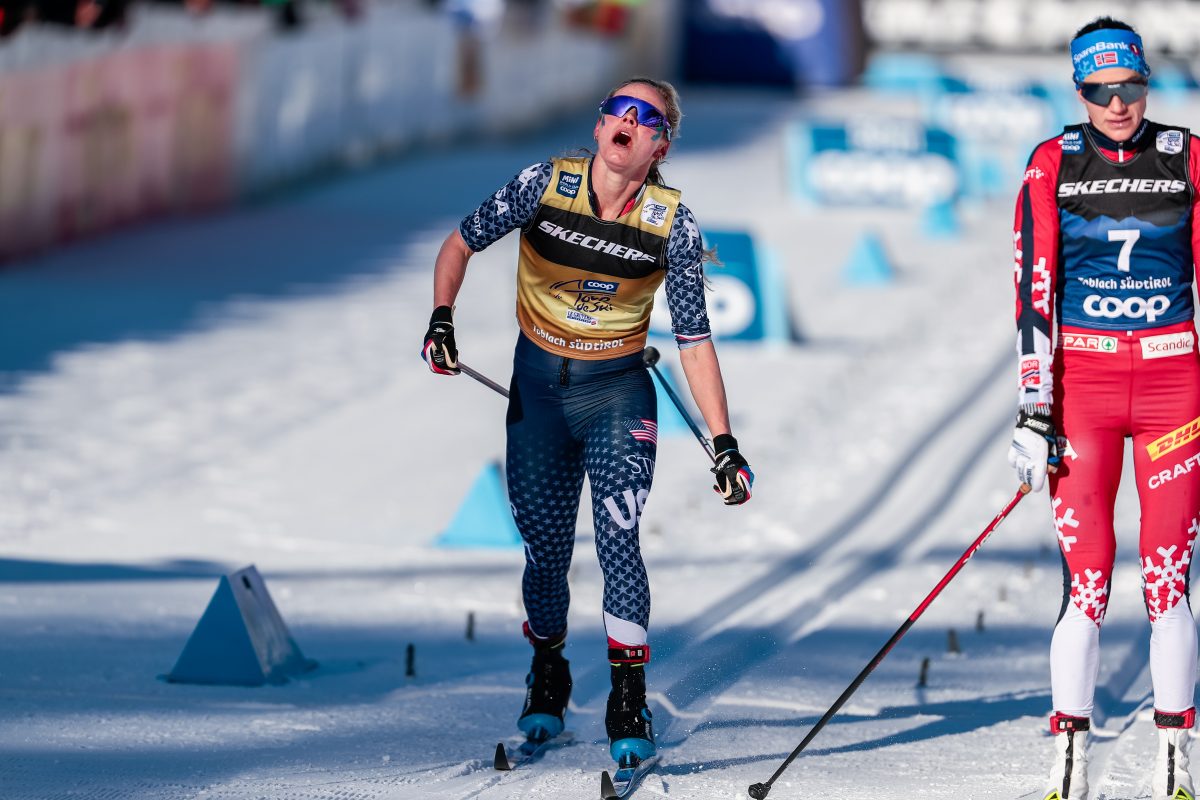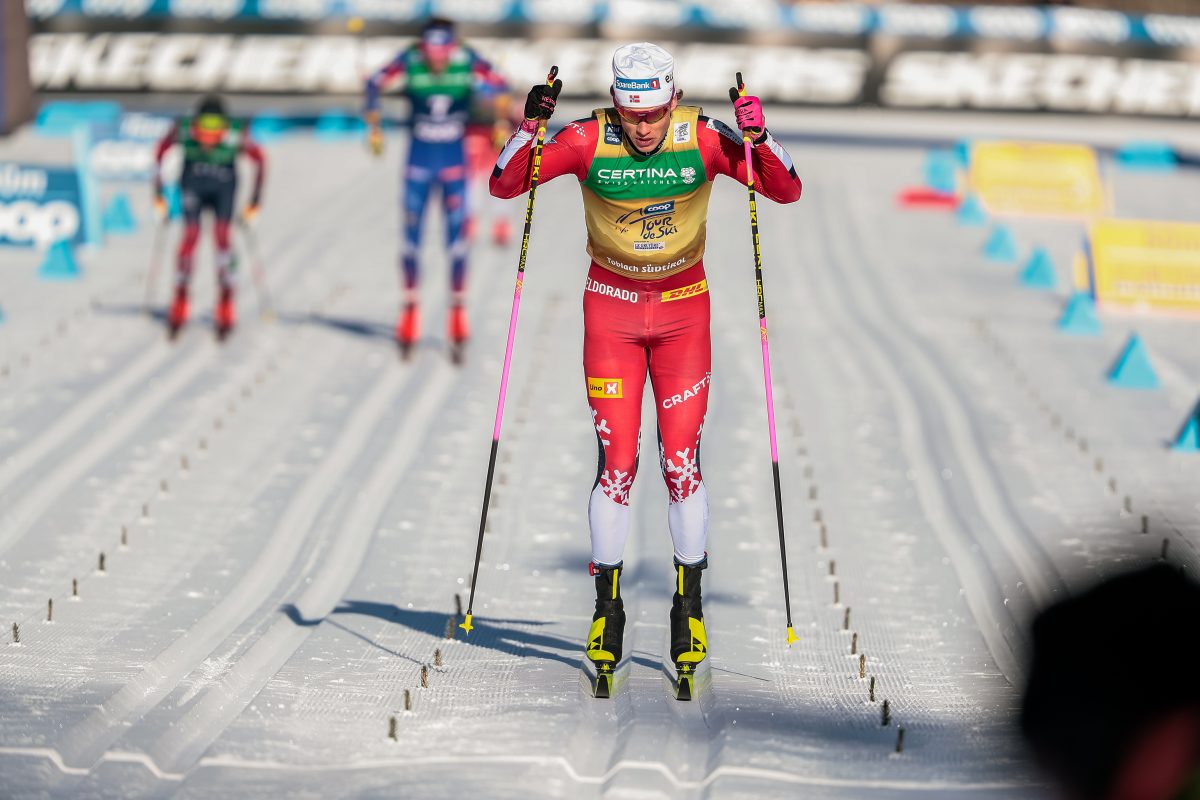
Good thing Jessie Diggins has perspective.
Sure, it doesn’t hurt that she’s only 19, with plenty more international racing in her future, including a trip to the 2011 World Ski Championships later this winter.
But still, some athletes would be bitter, disappointed, or downright pissed off to crash out of contention in a big race they had a shot at winning. Not Diggins, who picked herself up after a broken pole in the first kilometer and still went on to finish 12th in Sunday’s 10 k pursuit race at World Juniors in Estonia.
“It happens, it’s going to probably happen again, and it’s happened before,” she said. “Out of the pursuit races I’ve done, that was definitely the best one. So I can look back and say it was a solid effort.”
Indeed. As U.S. coach Matt Whitcomb put it, it was clear to the Americans that the pursuit was a “winnable race” for Diggins. “Knowing that is far more valuable,” he added, than any result in Otepaa.
Indeed, Diggins’ effort was promising, but it still wasn’t enough to close down her 30-second gap to the leaders after the crash.
Norway’s Heidi Weng finally got the gold medal she was after in Estonia, outsprinting her teammate and cousin Martine Ek Hagen in the stadium. Germany’s Helene Jacob was third; Annika Hicks was the top Canadian finisher in 31st.

While Diggins delivered her second straight sensational performance in Otepaa, she was nowhere to be seen among the leaders at the start of the race. Seeded 10th, she should have been right at the front; instead, she was bringing up the rear.
“Someone switched lanes—I went down, got up, went down, broke a pole,” she said.
Canadian coach Mike Cavaliere handed her a spare, but not before Diggins had lost more than half a minute, leaving her in 65th place at the first time check. At that point, she had her work cut out for her in a big way, but according to Whitcomb, there wasn’t much concern that Diggins would give up on the race.
“My feeling was, ‘thank God that’s Jessie,’” he said. “She works really well at chipping away at the people ahead of her. Give her a project, she gets it done—in a funny way, it was the best person that could have broken a pole, for us.”
After picking her way through the field in the classic leg, Diggins was in 17th. A quick gear exchange helped, which she chalked up to the lack of pressure that comes with skiing at the front.
In the skate leg, she had to strike out along, chasing the group of leaders containing 11 women.
Her job wasn’t made any easier by the gusty winds that blew all morning, leaving powder in the tracks and even miniature snowdrifts in some places.
“She was in no man’s land, just fighting to get place after place,” Whitcomb said.
By the finish, though, Diggins still managed to move up to 12th, and her time over the last nine kilometers of the race was just ten seconds slower than that of the top two finishers. In a way, she said, the broken pole may have helped.
“If I hadn’t crashed, I would have still been with the lead pack. But I might have let that mess with my head,” she said. “I might have needed [the mishap] to be able to relax and have a good race.”
Her teammate Joanne Reid was 24th – she said she felt “pretty good,” and also had a smooth exchange. She’d been practicing, with help from her Colorado University roommate Eliska Hajkova.
“[She] had the fastest split for that two years running,” Reid said. “She taught me how to do it.”
Weng, meanwhile, got her second medal of the championships, after a bronze in Wednesday’s 5 k freestyle left her looking so dissatisfied that it might as well have been a lump of coal.
Weng, according to the Norwegian doctor, Kjell Vegard Mykland, is the country’s “greatest talent we’ve had in years”—better even than Therese Johaug.
But at this point in her career, he said, Weng is still “not that confident, and you can see that through the results.”
Sunday’s race, though, should serve as a boost. She and Hagen escaped on the last of two skate laps, skiing away from a small group that included two Russians, Elena Soboleva and Anna Scherbinina, that had looked threatening in the classic leg.
Hagen did most of the leading, and stretched Weng nearly to her breaking point.
“I was very close to letting Martine go,” Weng said.
She held on, though, and outsprinted her teammate and cousin in the stadium for a gratifying win. Jacob made a late charge to challenge Hagen, but fell just short.
Two medals for the one country is no mean feat, but how about for one family? According to Mykland, Hagen and Weng are second cousins, grew up together, and have attended the same school for the last 10 years.
“They know each other pretty well,” he said.
Nathaniel Herz
Nat Herz is an Alaska-based journalist who moonlights for FasterSkier as an occasional reporter and podcast host. He was FasterSkier's full-time reporter in 2010 and 2011.




One comment
Tassava
January 30, 2011 at 12:30 pm
Tough break for the kid! She nearly pulled off the Estil comeback, though. I love the spirit in her racing and the maturity in her quotes!